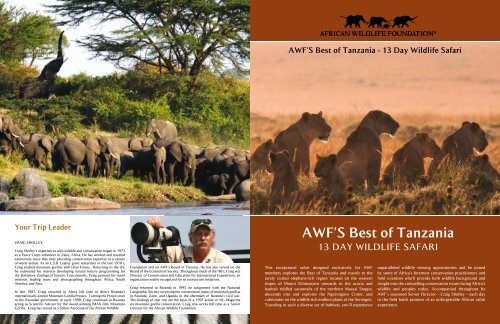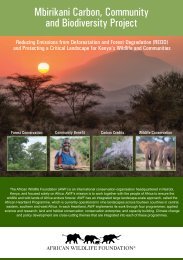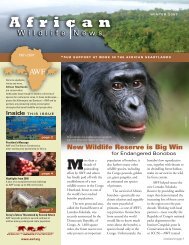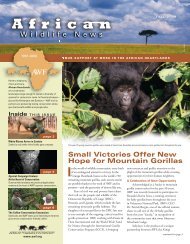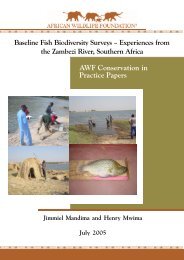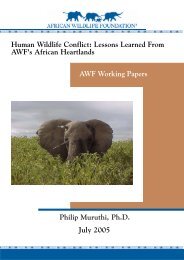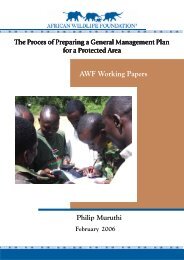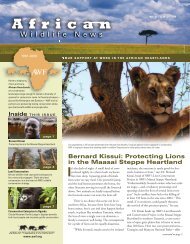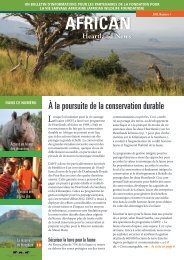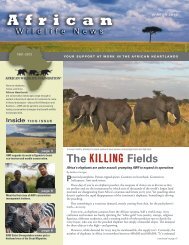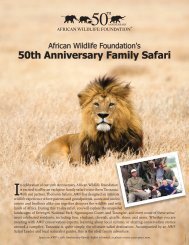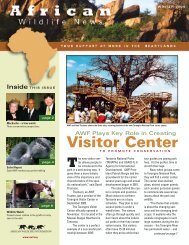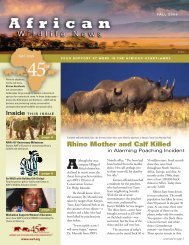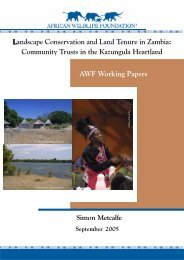AWF'S Best of Tanzania - African Wildlife Foundation
AWF'S Best of Tanzania - African Wildlife Foundation
AWF'S Best of Tanzania - African Wildlife Foundation
- No tags were found...
Create successful ePaper yourself
Turn your PDF publications into a flip-book with our unique Google optimized e-Paper software.
AWF’S <strong>Best</strong> <strong>of</strong> <strong>Tanzania</strong> - 13 Day <strong>Wildlife</strong> SafariYour Trip LeaderCraig SholleyCraig Sholley’s experiences with wildlife and conservation began in 1973as a Peace Corps volunteer in Zaire, Africa. He has worked and traveledextensively since that time providing conservation expertise in a variety<strong>of</strong> world arenas. As an L.S.B. Leakey grant researcher in the late 1970’s,Craig studied mountain gorillas with Dian Fossey. Returning to the US,he redirected his interests developing natural history programming forthe Baltimore Zoological Society. Concurrently, Craig pursued his travelinterests leading tours and photographing throughout Africa, SouthAmerica, and Asia.In late 1987, Craig returned to Africa full time to direct Rwanda’sinternationally-known Mountain Gorilla Project. Turning the Project overto the Rwandan government in early 1990, Craig continued in Rwandaacting as Scientific Advisor for the award winning IMAX film, MountainGorilla. Craig has served as a Senior Associate <strong>of</strong> the <strong>African</strong> <strong>Wildlife</strong><strong>Foundation</strong> and on AWF’s Board <strong>of</strong> Trustees. He has also served on theBoard <strong>of</strong> the Ecotourism Society. Throughout much <strong>of</strong> the ‘90’s, Craig wasDirector <strong>of</strong> Conservation and Education for International Expeditions, anorganization widely recognized for its ecotourism initiatives.Craig returned to Rwanda in 1995 on assignment with the NationalGeographic Society surveying the conservation status <strong>of</strong> mountain gorillasin Rwanda, Zaire, and Uganda in the aftermath <strong>of</strong> Rwanda’s civil war.The findings <strong>of</strong> that trip are the basis <strong>of</strong> a 1995 article in NG Magazineon mountain gorilla conservation. Craig now works full time as a SeniorDirector for the <strong>African</strong> <strong>Wildlife</strong> <strong>Foundation</strong>.AWF’S <strong>Best</strong> <strong>of</strong> <strong>Tanzania</strong>13 Day <strong>Wildlife</strong> SafariThis exceptional safari designed exclusively for AWFmembers explores the <strong>Best</strong> <strong>of</strong> <strong>Tanzania</strong> and travels to therarely visited elephant-rich region located on the westernslopes <strong>of</strong> Mount Kilimanjaro onwards to the acacia andbaobab riddled savannahs <strong>of</strong> the northern Maasai Steppe,descends into and explores the Ngorongoro Crater, andculminates on the wildlife rich endless plains <strong>of</strong> the Serengeti.Traveling in such a diverse set <strong>of</strong> habitats, you’ll experienceunparalleled wildlife viewing opportunities and be joinedby some <strong>of</strong> Africa’s foremost conservation practitioners andfield scientists who’ll provide both wildlife background andinsight into the compelling conservation issues facing Africa’swildlife and peoples today. Accompanied throughout byAWF’s seasoned Senior Director – Craig Sholley – each dayin the field holds promise <strong>of</strong> an unforgettable <strong>African</strong> safariexperience.
All brochure images – Craig R. Sholleyjourney by roadjourney by airAWF’S <strong>Best</strong> <strong>of</strong> <strong>Tanzania</strong> - 13 Day <strong>Wildlife</strong> Safari - July 25 - August 7, 2009Saturday, July 25Traveling to <strong>Tanzania</strong>Today board your international flight toAfrica. There are a variety <strong>of</strong> ways to get toArusha’s Kilimanjaro International Airportfor the start <strong>of</strong> the safari, and with assistancefrom AWF’s tour operator and partner incountry, we’ll help to ensure the travel bestsuited to you. (Meals al<strong>of</strong>t)Sunday, July 26Arusha and West Kilimanjaro RegionOn arrival in <strong>Tanzania</strong>, you will be met anddriven to Kambi ya Tembo located on thewestern flanks <strong>of</strong> Mount Kilimanjaro. Kambiya Tembo is a luxury tented camp that islocated in the vicinity <strong>of</strong> AWF’s ElephantResearch Camp. The tented camp will beyour base for the next three nights, and fromcamp you’ll have an opportunity to learnhow this region is being conserved to protectthe future <strong>of</strong> elephants and other wildlife inthis important trans-boundary area near theKenya and <strong>Tanzania</strong> border.While in the Kili region, you’ll havethe opportunity to meet AWF ElephantResearcher and Charlotte Fellow AlfredKikoti who has been investigating ways togive both elephants and people the spacethey need. Alfred’s research is informingconservation strategies by gaining a greaterunderstanding <strong>of</strong> elephant populations inthe West Kilimanjaro region <strong>of</strong> <strong>Tanzania</strong>.By collaring elephants with GPS technology,Kikoti is collecting data on elephant habitatsand movement patterns. The information hegathers will help AWF develop conservationstrategies that will give migrating animals inthis trans-boundary area the widest berthpossible. (*BLD)*in-flight mealMonday & Tuesday, July 27, 28W Kilimanjaro and AWF’s KilimanjaroHeartlandOver the course <strong>of</strong> these two days, youwill explore the W Kili region searchingspecifically for some <strong>of</strong> the extraordinary bigbull elephants which regularly reside here. Inaddition, you will observe a diversity <strong>of</strong> otherlarge mammals and birds and gain importantinsight into the important conservationinitiatives AWF is undertaking in this region<strong>of</strong> N <strong>Tanzania</strong> and immediately across theborder in Kenya. This trans-boundary regionis a critical wildlife area and over the pastseveral years AWF has helped to establisha nationally recognized elephant movementcorridor and is managing a large ranch hereas a protected area for wildlife. (BLD)Wednesday, July 29Arusha and Manyara RanchThis morning, you rise early and immediatelyafter breakfast head overland to Arusha anda visit to AWF’s regional <strong>of</strong>fice. At the <strong>of</strong>fice,you’ll receive a briefing introducing you toconservation issues throughout <strong>Tanzania</strong>.You’ll learn about the effort being undertakenby AWF to protect some <strong>of</strong> the wildlife richgrasslands <strong>of</strong> northern <strong>Tanzania</strong>, and howwildlife is innovatively used as an economicincentive for the people <strong>of</strong> the region toprotect large landscapes for elephants andthe other large mammals.After the briefing, you’ll drive overland forabout two hours to Manyara Ranch and amobile tented camp set up exclusively foryour group. A mobile tented camp is one<strong>of</strong> the most comfortable and exciting waysto experience the remote bush. Large tentsinclude proper beds and other furnitureas well as three separate private canvaschambers: shower, toilet and vanity area.Manyara Ranch is a flagship project createdto protect a 45,000-acre seasonal wildlifemigration corridor between Lake Manyaraand Tarangire National Parks.As the first example <strong>of</strong> land protected underthe umbrella <strong>of</strong> the newly created <strong>Tanzania</strong>Land Conservation Trust, AWF is utilizing aholistic approach to land conservation thatincludes wildlife protection and conservationenterprise while simultaneously addressingthe needs <strong>of</strong> the local Maasai community. Thisis a model that AWF is hoping to duplicatethroughout northern <strong>Tanzania</strong>. In additionto its importance as a corridor, ManyaraRanch <strong>of</strong>fers exciting conservation outreachpotential for showcasing how communitiescan benefit from wildlife conservationoutside <strong>of</strong> protected areas. (BLD)ThursDAY & Friday, July 30, 31Manyara Ranch & Tarangire National ParkOn these two days, you’ll continue toexplore Manyara Ranch including a visit toManyara Ranch School. Several years agoas a key conservation strategy, AWF andfellow stakeholders sought to relocate theexisting ramshackle school by rebuilding thecampus in a safer position that was closer tocommunity resources and services. Doing soprovided an unparalleled example <strong>of</strong> howconservation can actually enhance the lives<strong>of</strong> people who share their backyard withwildlife.You will also visit nearby Tarangire NationalPark. Tarangire is known as the ‘BaobabCapital <strong>of</strong> Africa’ and is distinguished by abaobab riddled landscape that includes densewoodlands and great sand rivers. One <strong>of</strong> thehighlights <strong>of</strong> your visit to Tarangire includesa chance to meet AWF’s lion researcher,Bernard Kissui, who will brief you on hiswork on lion-human conflict issues withinthe Maasai Steppe.On the game drive through the park, expect toencounter a great range <strong>of</strong> animals includinggiraffe, zebra, impala and a number <strong>of</strong> otherantelope species. The park is especiallyknown for its large elephant population, andyou’re likely to have some exciting and closeencounters. (BLD)SATURDAY, August 1Ngorongoro CraterThis morning, you depart Manyara Ranchand ascend the western wall <strong>of</strong> the Great RiftValley and continue to Ngorongoro Crater.The spectacular drive through a highland rainforest is one <strong>of</strong> the most beautiful in Africa.Tented Eluai Camp, your home for the nexttwo nights is located near the great craterand <strong>of</strong>fers easy access to this internationallyrecognized World Heritage site. (BLD)SUNDAY, August 2Ngorongoro CraterBefore dawn you descend into the crater.Three million years ago this was probablythe earth’s highest structure, an activevolcano which blew its stack in a relativelyshort hundred thousand years. Todaywhat remains is a wildlife paradise andfeast <strong>of</strong> beauty. The caldera is 102 sq.miles surrounded by an 1800-2000’ rim.The caldera has afforded wildlife specialprotection throughout the millennia,especially during the terrible years <strong>of</strong> heavypoaching. The area is very rich in wildlife,including some <strong>of</strong> the last free-ranging blackrhinoceros in East Africa. In consort withU.S. Fish and <strong>Wildlife</strong> and <strong>Tanzania</strong> NationalParks, AWF has established a programto monitor the rhinos <strong>of</strong> the crater. Thecrater is also known for its high density <strong>of</strong>carnivores – the lion prides are magnificentand all three species <strong>of</strong> jackals can be foundhere. Ngorongoro’s grasslands are filled withzebra and wildebeest and a host <strong>of</strong> othersmaller ungulates. Birdlife along the manysmall lakes in the Crater is spectacular. Youwill enjoy a picnic breakfast beside one <strong>of</strong>these lakes, and after lunch enjoy a secondgame drive in the afternoon. (BLD)MON-THURSDAY, AUGUST 3, 4, 5, 6Olduvai Gorge & Serengeti National ParkAfter breakfast, you begin your travels tothe world-renowned Serengeti NationalPark and tented Oltepesi Camp stoppingen-route to visit Olduvai Gorge. This tentedcamp is strategically located in an area <strong>of</strong>the park where wildlife is abundant. Manyungulate species congregate on these grassplains to feast on the nutrient <strong>of</strong> grasses thatgrow on these ‘endless plains.’ This immensecongregation <strong>of</strong> antelopes is <strong>of</strong>ten consideredthe most dramatic wildlife spectacle on Earth.Game viewing over the course <strong>of</strong> these fourmagical days on the great plains can occur foras long as you like, and with a couple <strong>of</strong> dayshere you will see extraordinary wildlife.Picnics can be taken along on game drives, oryou can return to camp for a sit-down meal. TheSerengeti National Park is home to more than2 million animals. In addition to the masses <strong>of</strong>wildebeest, one finds elephants, zebra, gazelle,eland, topi, hartebeest and much more. Ofcourse with abundant ungulate species, thereare also many predators, including lion, hyena,cheetah and leopard. (BLD)FRIDAY, AUGUST 7Serengeti National Park and ArushaAfter four exceptional days in one <strong>of</strong> theworld’s most wildlife rich areas, you will flyto Arusha where day rooms at MountainVillage await you. Here you can preparefor your flight home before transferring toKilimanjaro International Airport to clear<strong>Tanzania</strong>n customs and your internationalflights home. (BLD)SAFARI COST: $6360 per personplus international airfareWHAT’S INCLUDED* Complete pre-departure information to helpyou prepare for your safari* All transfers; meet and greet on arrival bySafari Legacy staff* All meals as stated in the itinerary* All taxes, service charges and park fees* Transportation in 4x4 Toyota Land Cruisers* All game drives; guided nature walks; entriesto Maasai Village* Temporary membership in Flying DoctorsService* Internal flight Serengeti-Arusha on last day* All activities as specified in the itinerary* Bottled water and refreshments while ongame drives* In summary, everything except internationalair, tips to safari guides, passport and visafees, and items <strong>of</strong> personal nature, such aslaundry, alcoholic beverages, etc.CANCELLATIONSAll cancellations must be received in writing,or by email and are effective upon receipt in our<strong>of</strong>fice. Cancellations received up to 90 days priorto departure will be refunded all monies less anadministrative charge <strong>of</strong> $150. Cancellationsbetween 89 and 61 days prior to departure areassessed a penalty <strong>of</strong> 50% <strong>of</strong> the safari cost.Cancellations between 60 and 0 days prior todeparture are assessed a penalty <strong>of</strong> 100% <strong>of</strong> thesafari cost.RATESAll rates are accurate and available at the time <strong>of</strong>publication. Safari costs are based on a minimum<strong>of</strong> 12 travelers on the safari.INSURANCETrip interruption/cancellation insurance aswell as air evacuation insurance is highlyrecommended. Safari Legacy recommendsTravel Guard for interruption/cancellationinsurance and AirMed for air evacuation. Pleasenote: Trip interruption/cancellation insurancewill need to be purchased within 15 days <strong>of</strong>receiving your deposit in order to qualify forany pre-existing conditions to be covered.Information on insurance will be sent to you inyour confirmation package after receipt <strong>of</strong> yourdeposit.


